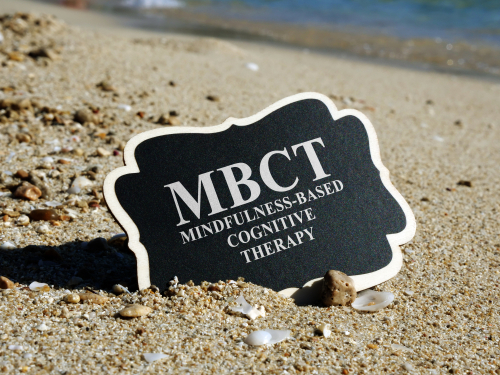
Posted November 2019 by John Sherk, B.S.W., B.S. Bible; MDiv.; 8 updates since. Reading time: 5 min. Reading level: Grade 9+. Questions on MBCT? Email Toni at: editor@online-psychology-degrees.org.
Mindfulness-based cognitive therapy (MBCT) modifies traditional cognitive therapy by adding elements of mindful meditation. Since cognitive therapy focuses on alleviating emotional distress, and mindful meditation can be used for that end, the two often fit hand in glove. Mindful meditation is a practice born in Buddhism and is rooted in that religion, along with its other practices. Nevertheless, MBCT borrows the practice and incorporates it into the presuppositions of cognitive therapy. With that in mind, the goals of mindfulness-based cognitive therapy are nonreligious. In particular, it was initially created to prevent relapse in people who suffer from anxiety and/or depression.
Goals of Mindfulness-Based Cognitive Therapy
Various therapists developed mindfulness-based cognitive therapy for anxiety and depression. People who suffer from anxiety and depression often experience automatic negative thinking as a symptom. This can lead to deeper and darker days than normal. Sufferers will struggle in their work or school, isolate themselves, experience suicidal thoughts, and even have trouble simply getting out bed. So, how does MBCT address these issues?
Employing both traditional cognitive therapy techniques, as well as breathing exercises and meditation from mindfulness, MBCT therapists teach clients how to break away from negative thought patterns that can cause a downward spiral. But what does meditation look like?
- It can last as short as a few minutes to as long as an hour or longer.
- A practitioner might listen to a recording of calming music, a rhythm to help their breathing pace, or a guided meditation.
- During the meditation, a practitioner will focus their mind and thoughts on their breathing rhythm, slowing and deeply breathing in and out.
- During a guided meditation, they might listen to someone describe a landscape, a scene, an affirmation, or guide the listener through a body scan. They’ll do this along with their breathing.
- Doing this routinely helps the practitioner draw their focus away from negative thoughts, calm down, lower their heart rate, increase oxygen to the brain, and prevent their symptoms from taking over.
Mindful meditation can help the brain physiologically change to prevent automatic negative thinking. These are the goals of mindfulness-based cognitive therapy.
Mindfulness-Based Cognitive Therapy for Depression
Mindfulness-based cognitive therapy was first created to prevent relapse for people who suffer from depression. How does it do this? Like CBT, MBCT assumes the theory that when individuals who have a history of depression become distressed, they intuitively return to automatic cognitive processes that can trigger a depressive episode. Therefore, the goal of MBCT for depression is to impede these automatic processes. It also involves teaching clients to focus less on reacting to triggering stimuli, and instead practice radical acceptance.
Even if someone can identify an oncoming episode and interrupt it with meditation, connections may still exist in the mind between the different symptoms. So someone might be able to interrupt their thoughts after experiencing a small trigger, but more severe triggers might feel more daunting. For that reason, mindfulness-based cognitive therapy for depression involves more than simply learning how to do meditation. Just doing meditation by itself merely addresses symptoms of depression, not more fundamental causes. As a model for cognitive therapy, it seeks to help build principal changes in the mind of the client, leading to more long-lasting change. This doesn’t necessarily mean that it can “cure” depression, but that it can empower the client to heal.
Mindfulness-Based Cognitive Therapy for Anxiety
How is mindfulness-based cognitive therapy used for anxiety? Although depression and anxiety are two fundamentally different conditions, they are numerous parallels. Especially given the simple fact that they’re mental health conditions. And so, they take the same approach in treatment.
When it comes to mindfulness-based cognitive therapy for anxiety, it helps clients learn how to identify their sense of being, and see themselves as distinguished from their thoughts and moods. This disconnect can enable them to become free from thought patterns in which the same anxious, negative messages recur and get replayed over and over. After developing an awareness of the distinction between their thoughts, emotions, and themselves, clients may discover that, while the self and the emotions exist at the same time, they do not necessarily have to exist within the same dimension. This insight can help healing by empowering individuals learn to interject positive thoughts into negative moods to disarm those negative moods. This is key to growing as a person who suffers from anxiety.
Does MBCT Work?
Fortunately, MBCT has considerable research and empirical evidence behind it. According to one meta-analysis, it was found that MBCT could be a viable option for individuals who suffer from depression to prevent a relapse. Additional studies have demonstrated that MBCT is most effective for treating people who have a history of at least three or more past episodes of major depressive disorder (MDD). People who developed depression due to a traumatic event, or another life event, were less receptive to MBCT treatment. We can maintain that mindfulness-based interventions support the decrease in depressive and anxious symptoms in addition to overall level of patient stress.
Critics of MBCT have pointed out methodological deficiencies in some studies due to their small sample size, a lack of control groups, and a lack of randomization. More meticulous studies remain necessary to evaluate whether MBCT is more effective than other forms of therapy such as cognitive-behavioral therapy.
If you’d like to learn more about mindfulness-based cognitive therapy for depression or anxiety, you can check out Mindfulness-Based Cognitive Therapy for Depression, and other related works. You can also explore mbct.com for more information.
More Articles of Interest:
- New and Emerging Therapies: Schema Therapy
- New and Emerging Psychology Therapies: EMDR
- How Psychologists Use Deception
- How is the Field of Psychology Changing?
